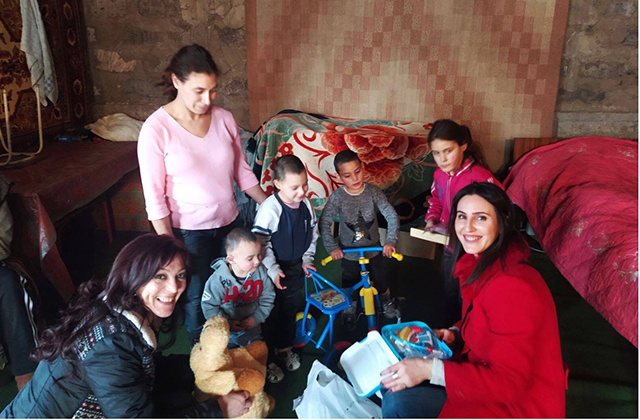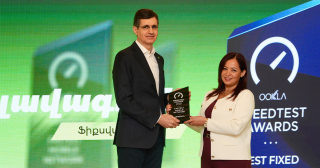Ten-year old Ani’s dream: “So that we win one day”

Artsakh Outreach project, implemented by the Mother See of Holy Etchmiadzin and its dioceses, has to continue with the continuous fundraising efforts by Armenians worldwide.
The aggression against Artsakh (Nagorno Karabakh) and Armenia, launched by Azerbaijan, Turkey and international terrorist forces since September 27, 2020 that lasted for 44 days, resulted in displacement of around 100.000 Armenians from Artsakh who found shelters in various regions of Armenia-proper. A significant share of these families have returned to Artsakh by now. However, both in Armenia and Artsakh there are hundreds of families with acute social and humanitarian needs. Official statistics lists more than 35.000 people lost their homes, and the families of slain and wounded heroes of war experience a long list of psychological and social issues.
By the blessings of His Holiness Karekin II, the Supreme Patriarch and Catholicos of All Armenians, a new project called “Artsakh Outreach” was initiated in December 2020 with the aim of better coordination of humanitarian assistance efforts of these most vulnerable families both in Armenia and Artsakh. All resources in Diaspora and Armenia have been pooled for this effort, chaired by Archbishop Khajag Barsamian – the Pontifical Legate of the Western Europe and Representative of the Armenian Church to the Vatican.
To contribute in this fundraising and keep our global community informed of the proceedings a special website was launched – www.artsakhoutreach.org. The first story in this blog is from Gyumri, second largest city in Armenia.
February 10, 2021
Today we are at the Social-Educational Center of the Shirak Diocese of the Armenian Apostolic Church, in Gyumri. The lists of the first beneficinaries of “Artsakh Outreach” project are ready. Their food boxes are carefully stored in the room.
“Ando jan, give that bag to me please”, local staffer Hripsime tells her colleague and then puts the food boxes and bags carefully next to each other. These have to be delivered to the families uprooted from Artsakh who now live in Gyumri.
Hripsime tells us that she and her fellow colleague Melanya know their beneficiaries by face, even though they are not few. The first phase of the “Artsakh Outreach” project had been already implemented and 50 families received their monthly food boxes and other housekeeping supplies. “The second phase began on February 1 and it will benefit 65 families. The same project will also continue to bring holiday presents for the kids. Around 2400 children of those that participated in the war and now found housing in Shirak diocese region will receive small presents”, Hripsime Palyan tells us and quickly adds with a sense of happiness: “Most of these families have many kids, 3-4 kids is the minimum. If they have only four, it means they just got married recently”.
The delivery of the food boxes and supplies is done by the clergymen of the Armenian Apostolic Church. The pastor of the local parish is normally part of all the activities. The holiday bags for the children has toys and sweets.
The clergymen of the Armenian Apostolic Church, true to their historic mission, at these difficult times too are on the forefront of the efforts to comfort the thousands of veterans of the latest war. Deacons and priests visit them, talk to them, share advice when they can…
It takes some time for the employees and volunteers of the Diocesan center to finish sorting and storing of all boxes. Then the delivery begins.
“So when are we going back to our village in Hadrout?”
Before the Diocesan Social-Educational Center’s staff and volunteers head out to the next home visits, one of the beneficiaries is here to get their food supplies on her own. With care that only a sibling can have, Hripsime tells the woman who stepped in: “Elina jan, why were you not picking up calls? I called a few times so that you could get the supplies sooner”. Hripsime knows very well how important this aid is for these aggrieved families.
Elina is in Gyumri with her three kids. Her son is 15 and daughters nine and eleven. Their home was in Saralanj village of Hadrout, which is by now under the enemy occupation. This slim lady gets even smaller under the weight of questions about Artsakh.
She tells us that they came to Gyumri on October 1. Before that they had another shelter in Artsakh. “When the war erupted on September 27, to be honest, we thought it was going to be like the one in April 2016. We thought we would get back in a matter of days. But then the bombs started falling in the close vicinity of the village and we had to flee to Spitakashen village which was in the deep rear and we thought it was safer. We stayed there for a day, then bombs started falling in Spitakashen too. We drove to capital Stepanakert… Then to Gyumri by buses”, Elina tells us. She has a big hope to go back to her native Artsakh one day. She says they are ready to go now if given new housing. “That’s our homeland, our land, who else shall return if not us… we had so many casualties, we fought so much… If we don’t return, all that would become in vain! Our children are longing for our home… Before, when we lived in the village, they would often want to go to the city… Now that we in Gyumri, they often ask – when are we going back to our village?”
Elina appreciates the care shown and the blessings of the Catholicos of All Armenians who made the “Artsakh Outreach” project possible. She says they are thankful for the care of all clergymen in Shirak as well as everyone in Gyumri for their help and support. “Even strangers would often come to us to help with something. They treated the children very nice in the school, talked to them often. We receive good support and we appreciate all that”, Elina concludes.
We want to go back to Artsakh, but it’s a bit scary
After seeing off Elina, Andranik, Hripsime and Melanya get into the car to hand deliver food and other supplies to the other beneficiaries. All boxes bear names and carefully stored in the trunk.
Deacon Roman joins them soon. Clergymen accompany the social workers during all home visits. We drive to the family of Marine and Davit who had to flee from New Maragha village of Artsakh. They now live in a small house in Gyumri’s Yerevanyan street. We drive in and see seven-year Nver, eight-year Artash and their three-year old brother Gor gazing at us from behind the building.
Marine says that they and longing for Artsakh and want to return soon. “We want to go back to Artsakh, but it’s a bit scary”, she drops.
Then I move closer to ten-year old Ani. She holds her present close and answers my questions with a sense of clumsiness. She wants to become a doctor. Asked what’s her biggest dream – she thinks a bit and then lookins into my eyes: “So that we win one day!” She says that and looks up to me to receive an affirmation of that possibility. In response I smile back and assure her that we will. Ani holds her toy even closer to her heart.
Ani’s brother Artash does not know any military songs, but has the seriousness of an army officer. Instead, Elen sings a tune: “I am a brave soldier and we are ready for the fight…” She stops right there, but that particular song by a small kid that lost a war during the war is already emotional for everyone around.
While deacon Roman is asking his questions to the children and praises them for the little things, the door opens and Marine’s in-law Lyuba enters home. Lyuba answers my questions with a resolve so particular for the Armenians from Artsakh. She tells me their house, gardens and everything are left behind in New Maragha village: “We had everything. We had best things. When the war started, we left for Drmbon. Then we had to flee again, but there was no space, so I stayed there for a week or so… Now I must go back to see how my husband is doing there”. Lyuba tells me that she cannot take her grandchildren to Mardakert just yet. The town is surrounded by the enemy forces. She is thankful for every big and small support they are receiving, but still wants to go back home. Meanwhile, the children are already busy with their new toys. We leave them there and depart to our next family.
“We began working with families in and from Artsakh during the war”
The preparations in the Social-Educational Center of the Shirak Diocese of the Armenian Apostolic Church in Gyumri, under the leadership of Primate Archbishop Mikayel Ajapahian, never ceased while we were out. The executive officer of the Center, Karine Gyudakyan, continues hands-on assisting her staffers and volunteers to pack the boxes with food and housekeeping supplies. She readily shares the work done during the war and in its aftermath: “We began working with the families from Artsakh since the first days of the war. Since the moment when first families started arriving in Gyumri we began cooperating with the Shirak municipality to prepare temporary shelters, food boxes, bed sheets etc – fully recognizing the fact that we must come to the rescue of our fellow compatriots who found themselves in critical situation. We had to do our very best”.
Ms Gyudakyan tells that their work has continued after the war as well. “Our attention, to the extent possible, is attached to those in rented housing, those living with relatives and those living in the spaces provided by the government. Everyone needs our attention, and we hope that the fundraising will continue to enable us do our fair share. Karine is happy that the efforts of the “Artsakh Outreach” project are very well targeted. “Families in critical situation have been identified and most of them have more than three children. This project has a comprehensive approach by providing all their monthly needs in food, housekeeping supplies and utility bills. We are trying to help at least with these immediate needs to enable our brothers and sisters see through this situation and adjust themselves to this new and uneasy situation”.
artsakhoutreach.org

























